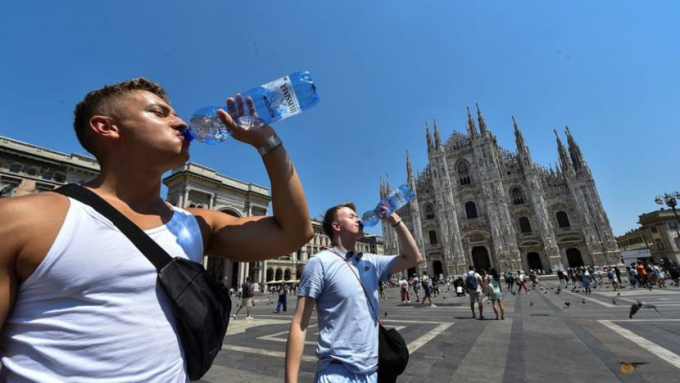November 20, 2025 | 22:42 GMT +7
November 20, 2025 | 22:42 GMT +7
Hotline: 0913.378.918
November 20, 2025 | 22:42 GMT +7
Hotline: 0913.378.918

People who live in warm-weather countries have typically acclimated to high heat. As a person is repeatedly exposed to high temperatures, they develop a lower heart rate and core body temperature over time, improving their tolerance.
The figures, which will likely change as records are updated, give the first indication of heat-related deaths when temperatures from London to Madrid hit nearly 40 degrees Celsius or higher.
The data for England and Wales released on Tuesday (Aug 2) by Britain's Office for National Statistics counts registered deaths during Jul 16-22 against what would be expected over the same period, based on 5-year mortality averages.
The toll for the Iberian Peninsula from the World Health Organization is also provisional.
But the figures from July came nowhere near the 70,000 heat-related deaths during a European heatwave in 2003.
Here are some of the factors that make some heatwaves deadlier than others.
SITUATIONAL
When and where a heatwave hits matters.
The 2003 heatwave hit in the first two weeks of August, closing businesses, wiping out crops and drying up rivers.
France's Paris region felt the effects most. Heatwaves are more intense in cities as concrete and asphalt absorb and retain heat.
The peak coincided with the traditional holiday period, when many children were out of school and families on holiday, in some cases leaving elderly relatives behind.
Of the nearly 15,000 people who died in France, more than 11,000 were over the age of 75.
"A fair number of people said goodbye to grandma sitting in her house and went on vacation," said Matthew Huber, a global expert on heat stress at Purdue University. "Normally, there would have been people checking in" on them.
Doctors were also on holiday. "Emergency services weren't so prepared, and they didn't have people on call," said Mathilde Pascal, a researcher with the French Public Health Agency.
France is now baking in its third heatwave of the 2022 summer, hitting wildlife as well as humans.
ADAPTATION
After the 2003 disaster, many European countries created heatwave action plans and began issuing early warnings. Experts say preparing for extreme heat can save lives.
"More people know what to do in response to a heatwave," said Chloe Brimicombe, a heatwave researcher at the University of Reading in Britain. But some countries are simply better equipped than others: almost 90 per cent of European households, according to US federal statistics.
But technology can't always help. This year, Palestinians living on the crowded Gaza Strip are living through a searing summer heatwave that has been made worse by power cuts that leave them without electricity for as much as 10 hours a day.
Nearly a third of the US population was under a heat warning last month, with forecasts predicting more extreme heat this month.
People living in poorer communities and the homeless are at higher risk.
During last year's heatwave in Phoenix, Arizona, 130 of the 339 people who died were homeless, local health officials said.
Some US cities, including Phoenix, have hired 'heat officers' to help communities cope by handing out water bottles or guiding people to air-conditioned cooling centres.
"The risk of heat-associated death among our unsheltered neighbours is 200 to 300 times higher than the rest of the population," Phoenix heat officer David Hondula said.
PHYSIOLOGICAL RESPONSE
People who live in warm-weather countries have typically acclimated to high heat. As a person is repeatedly exposed to high temperatures, they develop a lower heart rate and core body temperature over time, improving their tolerance.
So the temperature at which people start to die from heat-related illness varies depending on location, as does the related "Minimum Mortality Temperature (MMT)" when all deaths from natural causes reach their lowest point.
"If you're living in India, the MMT is much higher than if you're in the UK," Huber said.
Recent research also suggests that the MMT of an area can increase as heat rises. For every 1 degree Celsius rise in average summertime temperatures in Spain between 1978 and 2017, for example, scientists found a 0.73 degrees Celsius increase in MMT, a study published in April in Environmental Research Letters journal said.
But with much still unknown about extreme heat and human endurance, scientists are not sure if the changes they are seeing in MMTs over time might also be related to people being more aware of the dangers, or better equipped to deal with them.There are several possible explanations, and we still don't know which is the most important cause," Huber said.
(Reuters)

(VAN) In a new study published in Trends in Biotechnology, researchers used a gene-editing technology called CRISPR to increase a fungus's production efficiency and cut its production-related environmental impact by as much as 61%- all without adding any foreign DNA.

(VAN) A top official in Beijing’s Cop delegation says China is committed to clean energy – but US’s absence is a problem.

(VAN) The Bangsamoro region’s inflation rate rose slightly to –1.3 percent in October 2025 from –1.5 percent in September, the Philippine Statistics Authority (PSA-BARMM) reported.

(VAN) FAO-led report says protecting and restoring forests is crucial to boosting climate-resilient agriculture, rural livelihoods and global food and water security.

(VAN) Flagship partnership secures additional GBP 16.9 million to strengthen forest monitoring, transparency and country support to 2030.

(VAN) After a turbulent year for international development, the aid and assistance landscape has shifted, with donors rethinking how, where and why they support sustainable development.

(VAN) A new tool for measuring the economic value of farm animal welfare improvements has been developed, potentially transforming how consumers, retailers and the government evaluate animal welfare policies.